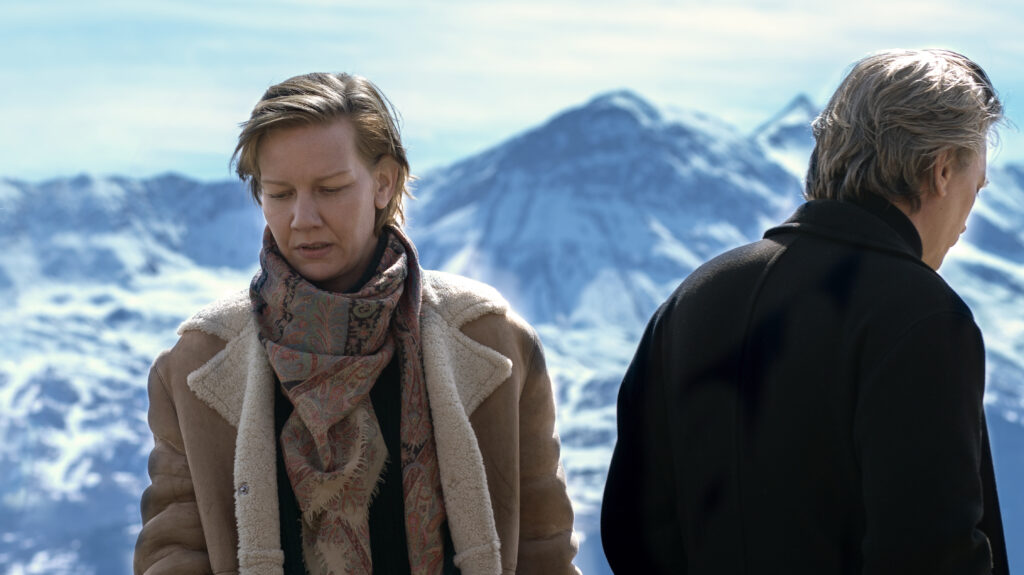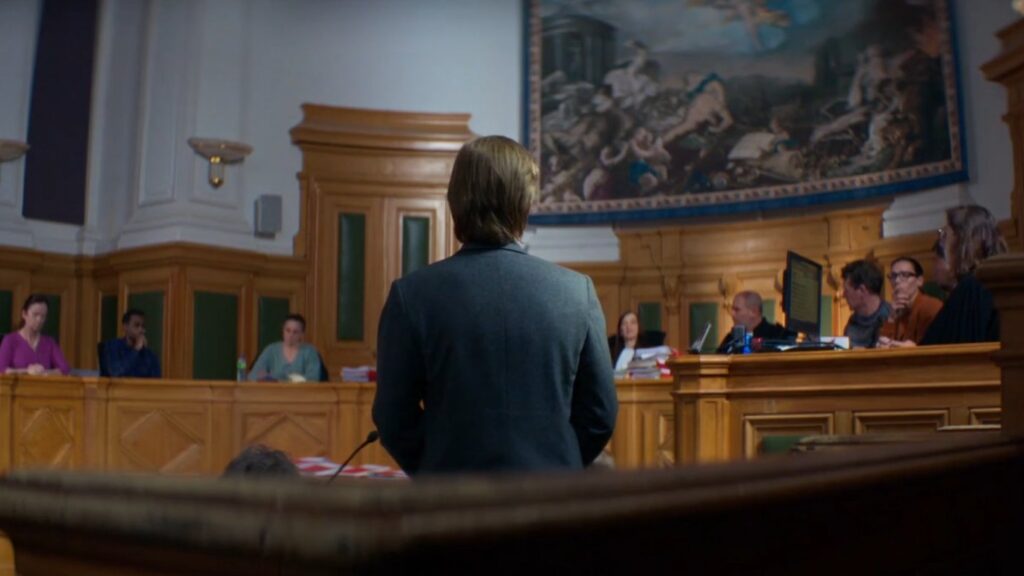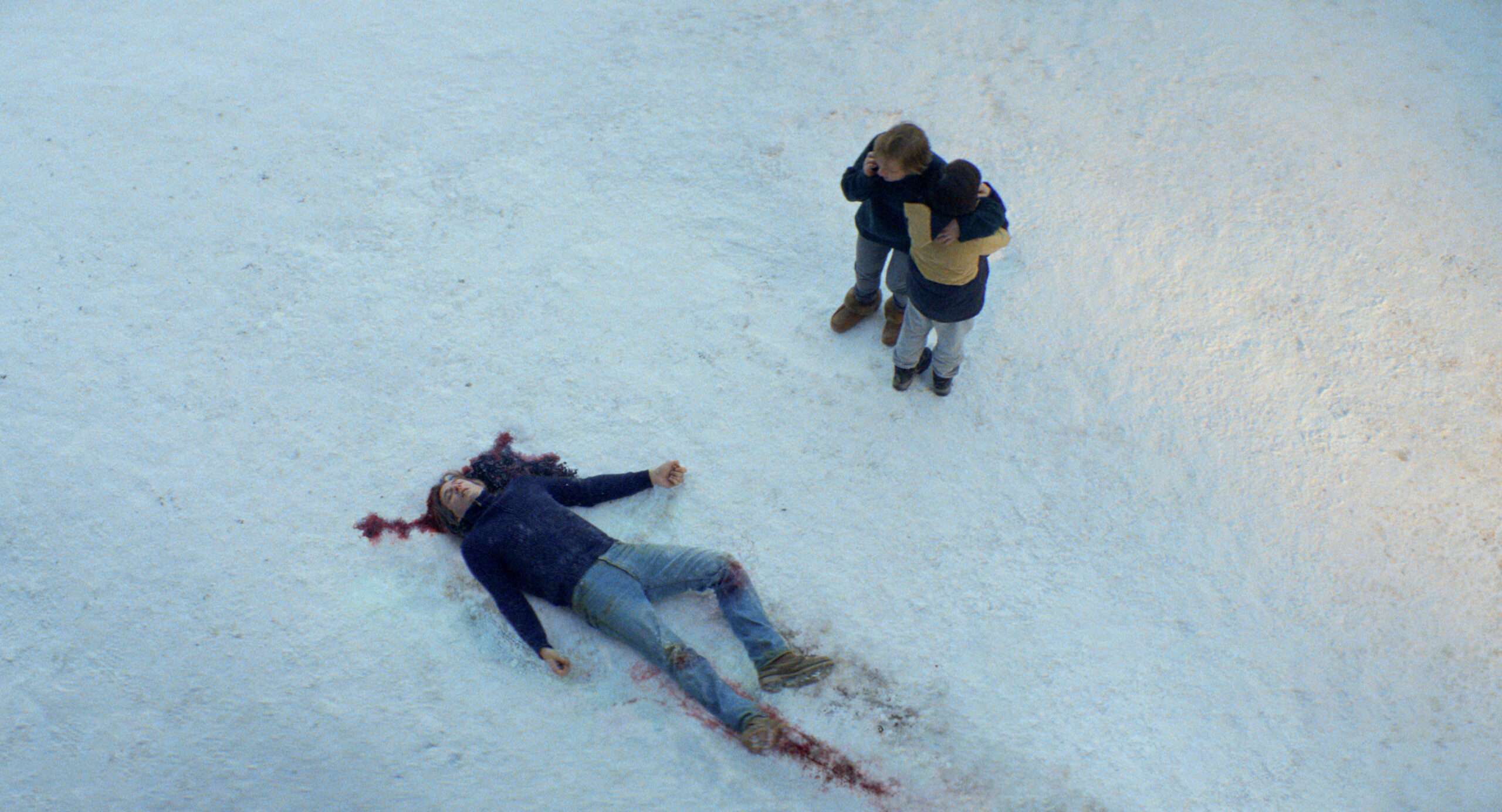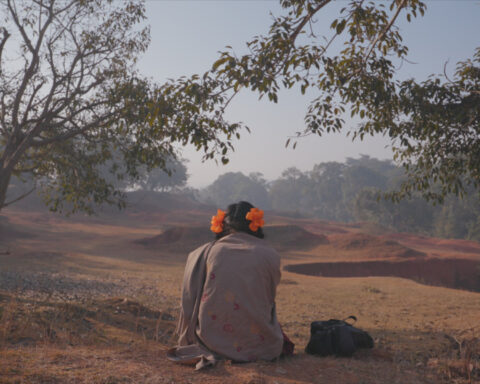In her first Palm d’Or-winning feature film, Anatomy of a Fall, Justin Triet, like an expert surgeon wielding a scalpel, skillfully peels back the layers of this seemingly stable relationship, revealing concealed wounds and smoldering resentments that have festered beneath the surface for years. The once-intact facade of marital bliss crumbles as the protagonist Sandra (Sandra Hüller) navigates through the emotionally charged terrain of a relationship in turmoil. Triet’s narrative approach delicately dissects the intricacies of the characters’ emotions, laying bare the layers of suppressed anger and aggression that have built up over time. The film becomes a poignant exploration of the fragile equilibrium that exists between understanding and compromise in a long-term relationship. The thin bridge upon which the characters tread precariously reveals the delicate balance that has held the union together, even as the weight of unresolved issues threatens to tip the scales. Set against the backdrop of a gripping courtroom drama, the narrative unfolds like a psychological thriller within the legal confines. With a running time of two hours and thirty minutes, the film stands as a testament to the power of film to illuminate the hidden corners of the human psyche, challenging viewers to confront the complexities that lie beneath the surface of seemingly ordinary relationships.
The narrative begins with Sandra Voyter, a renowned author, interviewed by an enthusiastic young student in the serene ambiance of her southwestern French chalet. Her visually impaired son, Daniel (Milo Machado Graner), attends to their dog Snoopy’s bath upstairs. While her husband Samuel (Samuel Theis) fills the house with the thunderous sound of his instrumental cover of 50 Cent’s ‘P.I.M.P.’ The interview is disturbed by the intrusion of the music and concludes abruptly. Following this, Daniel takes a walk with his canine companion. Upon his return, Daniel is shocked to discover his father’s lifeless body in a pool of blood, a gruesome sight that equally astonishes Sandra. Subsequently, pathologists examine Daniel’s body, revealing a head wound inconsistent with a simple fall. Expert testimonies reveal harsh realities, suggesting that Samuel’s demise was not accidental but the result of a fatal blow from a blunt object, propelling him out of the attic window. An air of suspicion envelops Sandra’s life like a looming shadow, casting a pall over every aspect of her existence and prompting haunting questions about the true nature of marriage and her identity as a best-selling writer.

The film’s title carries a nuanced duality. On a literal level, it symbolizes the investigative process unraveling the circumstances surrounding Daniel’s demise. Metaphorically, it encapsulates the collapse of the marital union between Daniel and Sandra, which unfolds within the confines of the French courtroom trial. The film evolves into an exploration of how couples commit themselves to keeping a relationship alive or, more significantly, how they fail to do so, and the profound repercussions that ensue. The narrative primarily delves into the potential consequences of such breakdowns as the layers of chaos between the couple are peeled scene after scene. Sandra, originally German, came to live in France, where Samuel grew up. Crucially, the linguistic landscape plays a pivotal role, as neither Sandra nor Samuel communicates in their native tongue, converging instead in the universal language of English. This linguistic choice emphasizes the struggle for understanding and connection. Meanwhile, Daniel’s diminished eyesight, a consequence of an accident at the age of four, symbolizes a broader theme: the challenge of perceiving and comprehending reality. Moreover, by striking a harmonious balance between introspection and suspense, the narrative tension reaches new heights by portraying both partners as writers. While Samuel also wields the pen, his literary prowess pales in comparison to Sandra’s, possibly kindling the embers of jealousy within him. So, as the story moves forward, it becomes a commentary on the complexities of human connection and the deep-seated impact of blame, grudge, and infidelity within relationships, pushing them to the verge of eruption. Triet expresses all of these through an artful and unconventional storytelling approach.
We are introduced to Sandra’s husband, Samuel, through the distinctive medium of his chosen music. As the decibels soar, discomfort permeates the viewer’s experience, fostering an initial perception of Samuel as an antagonist. However, as the trial progresses, the layers of his tumultuous personality come to light. It emerges that Samuel grapples with unforgivable guilt over his role in an accident years ago, which left Daniel severely visually impaired. This revelation raises the haunting question of whether Samuel’s despair led him to take his own life. Caught in a web of uncertainty, Daniel finds himself in a state of dilemma, unsure whether his mother is guilty or innocent. In doing so, Justine Triet deftly places the viewer in the role of judge, inviting them to untangle the threads of doubts woven around Sandra’s judgmental acts of the past and urging them to grapple with the mysterious essence of truth and the intricacies of the human psyche. Sandra’s lawyer, Vincent (Swann Arlaud), asserts that the trial is more about how facts are presented than the actual truth. Thus, the film opens up the possibility that multiple individuals might have been untruthful or uncertain in their testimony.

Simon Beaufils‘s choice of framing and perspective proves crucial to the thematic depth of The film employs compressed angles, fluid camera movements, and digital recordings to craft a visual language that enhances the overarching exploration of factualness and the maze-like dynamics within the narrative. Laurent Sénéchal‘s editing plays a crucial role in establishing a pace that facilitates the gradual unraveling of the convoluted and imperceptible knots in the film. As the film builds towards an emotional climax, particularly in an intense flashback that is shattering in its realism, the dramatic disclosure seamlessly emerges through the juxtaposition of past and present. The sound design by Fanny Martin contributes significantly to the film’s impact, creating moments of silence that allow viewers to delve into the minds of the characters and layer the scenes with intrigue.
Sandra Hüller seamlessly conceals many of Sandra’s motives and long-buried secrets within the depths of her internal world. Her performance is a carefully calibrated dynamic, exuding shrewd worldly sophistication. Antoine Reinartz, in his portrayal of the public prosecutor, infuses his character with authoritative charm, delivering his role with unwavering conviction and genuineness. Swann Arlaud, as Vincent, acts as a pillar of support for Sandra, serving as her lawyer with a calmness that exudes maturity and skill, even in moments of crisis. Milo Machado Graner endows Daniel with innocence and the strength to understand that truth is a fluid concept, encapsulating the film’s central philosophy. Regrettably, he grapples with the bitter realization of this verity at a tender stage in his life.
Anatomy of a Fall decisively diverges from anticipated conventions of procedural and courtroom dramas, embracing a detached style that is distinctive and refreshing. Nevertheless, the film’s ambitious spirit, while admirable, encounters a hurdle in its 152-minute runtime. Coupled with pervasive verbosity, it becomes a potential stumbling block, hindering sustained engagement throughout.
Anatomy of a Fall is now playing in some of the selected theatres across India.





